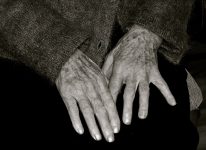Sydney Grandmother Faces Execution

Mrs Nguyen Thi Huong looked anguished as the court in Ho Chi Minh City read its verdict recently. The 73-year-old Vietnamese-Australian woman has been sentenced to death for heroin trafficking.
It sounds implausible … incongruous, but Vietnamese community leaders in Australia say it is not uncommon: traffickers targeting elderly female mules in the belief they will not be searched, and conning them into believing they won’t face harsh punishment if they are.
Heroin Contained in Soap
The media photos of Nguyen Thi Huong depict a desperate woman. Frail, with her long grey hair tied in a bun, she is clearly distressed as she faces her fate.
Despite pleas for leniency by her lawyer and the Australian embassy, Mrs Huong faces death after already spending 18 months behind bars since being arrested at Tan Son Nhat international airport in December 2014.
Mrs Huong is an Australian citizen who migrated to Sydney with her husband and four children in 1985.
She says she was visiting family in the coastal town of Vung Tau in 2014, when a woman named Helen gave her soap as she was walking along the beach. Huong says she intended to bring the soap back to Australia as gifts for friends and family.
However, she was arrested while preparing to board a flight to Australia, after security personnel became suspicious of the 36 bars of “soap” in her luggage.
Subsequent testing found the bars to contain 1.63kg of heroin, and Huong was charged with ¬illegally exporting drugs.
Huong maintained her innocence, telling the court she had no idea the soaps contained drugs. She entered no plea, but appealed for leniency, saying she was “old and weak” with only few years left to live.
According to local media reports, she has “many diseases” and is not expected to “live very long”.
Death Sentence
The court said there was no evidence of a woman called ‘Helen’, and formed the view that she was guilty of the crime. In sentencing, the court found that the seriousness of the offence and the need to deter others outweighed any consideration of Mrs Huong’s frail health.
The court said the offence was “extremely dangerous to the community”, sentencing the grandmother to death by lethal injection.
In Vietnam, the death penalty is applicable in cases where 100 grams or more of heroin is imported or exported. In late 2013, Vietnam adopted the use of lethal injection for capital cases, replacing the firing squad.
The Australian government issued a statement saying:
“We are concerned that an Australian citizen has been sentenced to death in Vietnam.
“We will continue to provide consular assistance and support to the woman and her family.”
Possible Appeal
Mr Huong has 15 days to appeal the sentence. Her lawyer, Nguyen Nguyen Thy, who has represented her pro bono, told The Australian they will appeal against the sentence, but feel pessimistic given the amount of heroin involved.
“Vietnamese law is very strict when it comes to drugs-related crimes. The sentences are impersonal and mostly meant to deter others,” Ms Nguyen said.
The Vietnamese Community of Australia says drug syndicates often target elderly people, particularly women, believing they are less likely to be stopped and searched. It says there are cases where elderly Vietnamese Australians have been forced into drug trafficking by loan sharks to pay debts.
Vietnamese Law
Vietnam has some of the toughest drug laws in the world.
The Australian Smart Traveller website advises:
“Penalties for drug offences are severe and include the death sentence. Vietnamese authorities have strict security measures to combat drug trafficking.”
There are currently more than 30 Australians serving lengthy prison sentences, including life sentences, for drug offences in Vietnam.
Drug Trafficking in Australia
Importing and exporting drugs are offences under the Commonwealth Criminal Code.
The maximum penalty depends on the quantity and type of drug involved.
Below is a table containing offence categories and corresponding quantities for different types of drugs:
| Offence | Quantity |
| Importing a commercial quantity of drugs (Div 307.1) |
|
| Importing a marketable quantity of drugs (Div 307.2) |
|
| Importing any quantity of drugs (s 307.3) | The prosecution does not need to prove a particular quantity; it will be enough to import any quantity of drugs. |
And here are maximum and mean penalties for those who are found guilty.
| Offence | Quantity | Maximum Penalty | Median penalty |
| Importing a commercial quantity of drugs (Div 307.1) |
|
Life imprisonment and/or $825,000 fine. | Imprisonment (92%), with full term of 8 years and non-parole period of 6 years. |
| Importing a marketable quantity of drugs (Div 307.2) |
|
|
Imprisonment (99%), with full term of 6 years and non-parole period of 4 years. |
| Importing any quantity of drugs (s 307.3) | The prosecution does not need to prove a particular quantity; it will be enough to import any quantity of drugs. | 10 years imprisonment and/or $220,000 fine. | Imprisonment (62%), with full term of 18 months and non-parole period of 12 months. |
If you are charged with ‘drug trafficking’, it is important to seek specialist representation from criminal defence lawyers who are experienced in representing clients for serious drug cases.
Good criminal lawyers can often have cases withdrawn or downgraded at an early stage, or thrown out of court where cases proceed to trial.
Where clients wish to plead guilty, they can work towards achieving the most lenient penalty possible in the circumstances.
Sydney Criminal Lawyers® offers a free first conference for those charged with serious drug offences, or their family members if the client is in custody.
We are also available to attend prison visits throughout NSW.
Receive all of our articles weekly
Author






